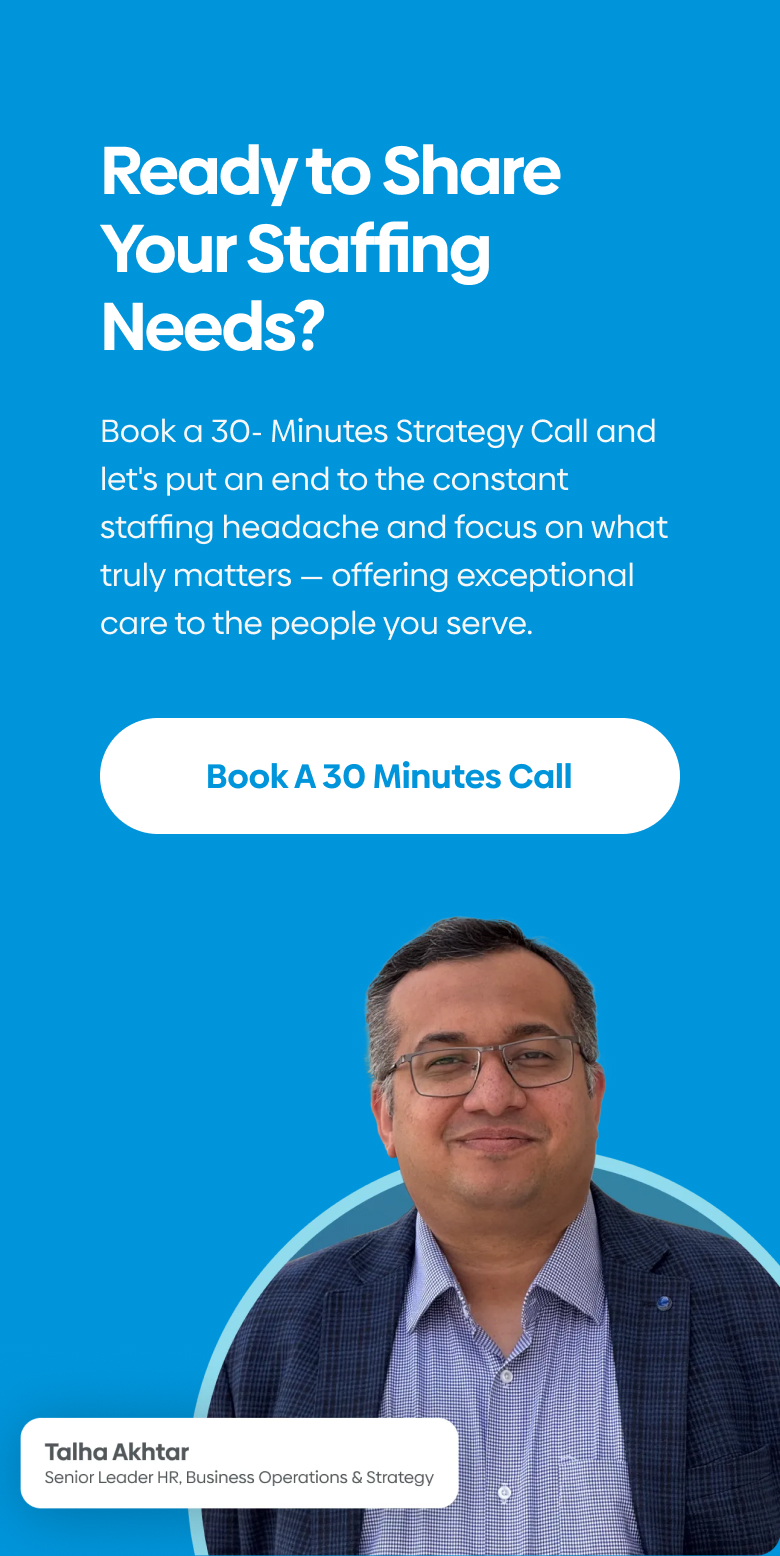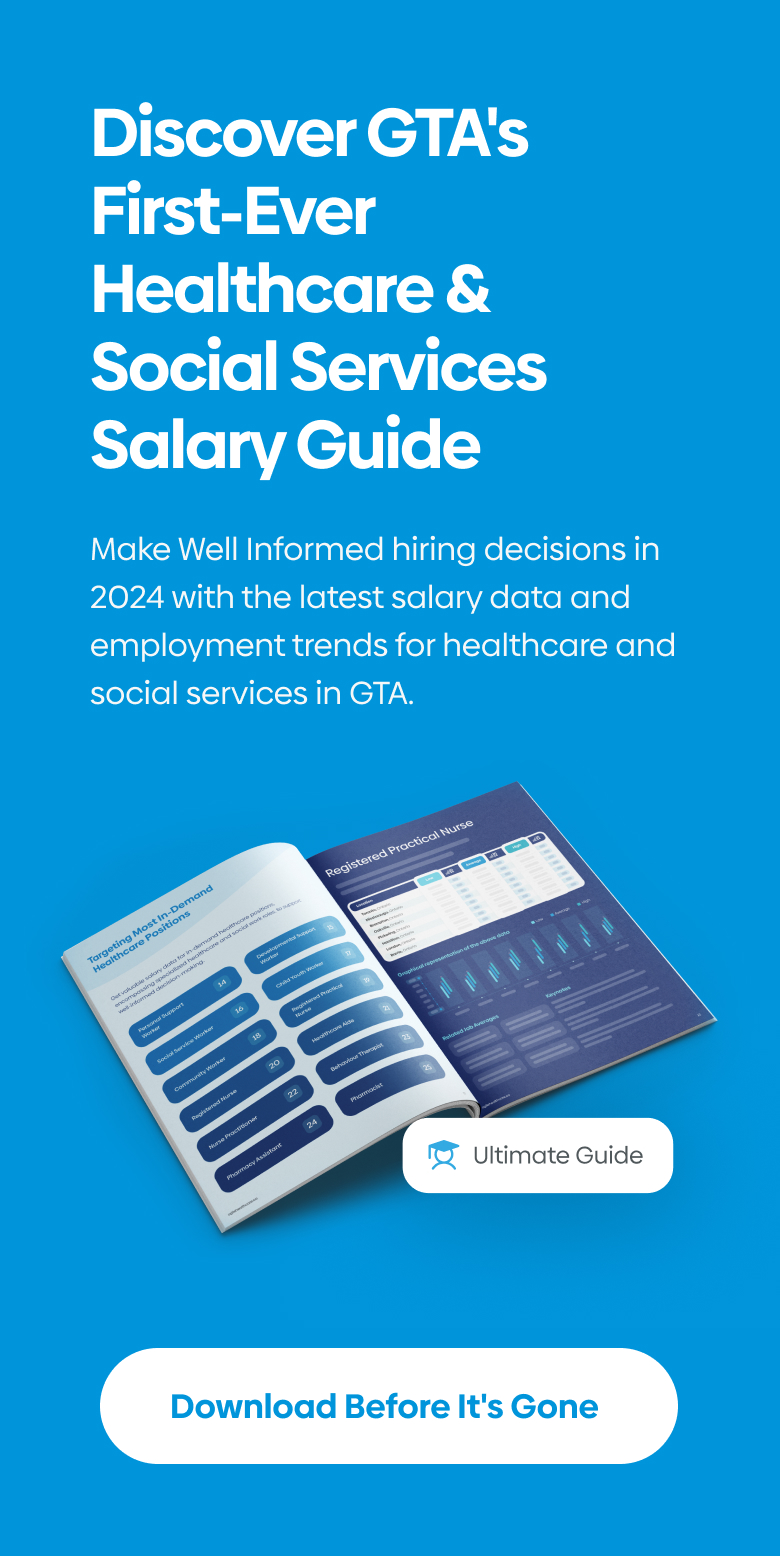
What are those qualities that you should consider when hiring a caregiver?
While there is no one-fits-for-all answer to that question, but we know one thing: finding the right caregiver is all about asking the right questions.
In culturally diverse areas like the Greater Toronto Area, finding the ideal candidates goes beyond just resumes and skills. As mentioned in our 2024 Salary Guide:
62% of hiring managers in Canada currently need help filling their open roles.
Therefore, we have compiled the top 7 qualities you might look for when hiring new staff for your facility. Giving it a quick read might help you ask the right questions that reveal the heart and skill of a trustworthy and genuine caregiver.
1. The “IT Factor”
A compassionate personality shines through every interaction with their patients.
It takes a special kind of person to be a healthcare worker. The best caregivers in this industry are driven by deep-seated passion for providing care and making a lasting impact in the lives of their patients. They are intrinsically driven by a desire to help people in need and support those who require them.
You can look for the “IT Factor,” which is the personal connection and drive to want to be there for the people you are supporting.”
– Lena R. Ajax.
You might ask these questions to find out if the people you are hiring have a true passion for this industry:
- Why did you choose this career, and what inspired you to work in this field?
- Can you give an example of when you had to adjust your care approach due to unexpected changes in a patient’s condition or needs?
- What do you believe is the most important quality a caregiver should possess?
- How do you stay updated with the latest healthcare and caregiving practices developments?
- If you could change one thing about the way care is currently delivered, what would it be and why?
These questions aim to uncover the candidate’s true commitment and adaptability in this dynamic field. You can look for the people who find true fulfillment in their work and know they are making a meaningful difference in the lives of those they care for.
2. Emotional Intelligence
Don’t you just remember a few times when a patient and a caregiver didn’t get along? What would be the root cause for that? Is that the patient’s fault? Or the caregiver’s fault? And the reality is that whoever’s fault it was, one of the things that we can do as hiring managers is to always look for caregivers who exhibit more emotional intelligence.
It’s not easy for patients to deal with health issues, and it’s natural for them to experience emotional distress, anxiety or depression.
In such cases, all they need is people who can lend them ears, who can understand them, and delicately deal with their emotions without having to say it
Caregivers who are more observant and more caring tend to be more satisfied with what they are doing as they genuinely ought to help people on the floor. Only a person who can listen attentively, validate feelings and offer emotional support when needed can make a real difference and bring comfort to those in need.
3. Cultural Agility and Competence
Being culturally agile means being able to fit well and work efficiently with individuals from different cultural backgrounds.
If someone wants to experience a beautiful blend of diverse cultures, one can look into the GTA, Canada, as a great model. As a healthcare and social services worker in GTA, cultural agility is required to serve people with various backgrounds.
Always keep that in mind that the person we are caring for is somebodies family member and we have to treat them with dignity, respect and with honesty.
– Ruth G. Riverwood Senior Living
To provide the level of care you want for your patients, you might need to prioritize the people who show these qualities:
- Cultural sensitivity and respect for the patient’s beliefs mean that caregivers should be aware of their cultural background and beliefs and ensure that their medical care aligns with those beliefs.
- Having an understanding of their traditions and respect for their language is a must-have.
- You might look for people who deeply understand diverse populations and have undergone inter-cultural training.
These indicators can provide enough information to determine whether a worker can build strong bonds with diverse patients you serve.
4. Reference Checks and Certifications
People feel comfortable working with caregivers who hold professional certifications like Certified Nursing Assistant (CNA), Personal Support Workers (PSWC), or Certified Medical Assistant (CMA).
Why do they prefer them?
Because these certified caregivers usually have a higher level of expertise and knowledge and are capable of performing tasks that non-certified workers cannot. While certified caregivers may charge higher wages, their qualifications can provide peace of mind to people who are looking for the best possible care for their loved ones.
Reference checks are a basic but another crucial aspect to see before hiring a caregiver.
You might already be taking these actions, but it is worth revisiting.
- It’s recommended to check at least two references, both personal and professional ones.
- You can legally ask from previous employers, but some companies may have policies that limit what can be said about them.
- During the reference checks, You can ask questions like why the employee left. And if they are eligible for rehire.
- Keep in mind that not everyone fits well for the job, and sometimes people just don’t get along.
- If you notice multiple red flags during reference checks, take some time to think before making a decision.
Find Your Trusted Caregiver Today!
5. Ensure Clear Backgrounds by Leveraging the Internet
Any criminal history, driving violation or lies regarding professional experience may indicate alcohol abuse, recklessness, or carelessness
– Ruth G. Riverwood Senior Living
Standard background checks are great, but if you want to uncover any further information or more about a candidate’s professional background, you might look for extra “internet sleuthing”. By digging a bit deeper online, you might find something that could make all the difference in your hiring decision.
How you can start leveraging the Internet today?
While checking a candidate’s background, you could use these steps to make sure a genuine and skilled hire:
- Search for their name on search engines, LinkedIn, or any other social media platforms.
- After that, you can include specific details like their city or the job title in the search.
- Compare their different social media profiles and see whether what they are sharing about them is genuine and accurate or not.
- You can send them a connection request. Even if a candidate is hesitant to accept a connection request, it is recommended to just analyze their social profiles.
- Always be cautious if you notice multiple red flags, missed commitments, or lies regarding their professional experience.
At Agile Healthcare Solutions, we understand how important peace of mind is when it comes to caregiving. That’s the reason why we take background checks extremely seriously. No matter who you’re hiring a caregiver for, whether it’s yourself, your facility, or a loved one, we make sure to thoroughly check their background.
6. Adapting To Scenarios and Personalities
You need healthcare professionals who can respond quickly to the ever-changing needs of each patient, those who are agile and flexible enough to tailor their approach to meet their specific requirements.
So, what kind of healthcare professionals we are looking for? We need people who can size up to any situation, find out potential problems before they become blow-ups, and then come up with a winning plan to fix them.
Let’s see how this plays out in real life…
Medication Hesitancy
Every patient you meet has a unique personality, their needs are different and things can change from day to day. Sometimes, you might run into people who are hesitant about taking their meds, or maybe they struggle with everyday tasks. That’s where a thoughtful and caring caregiver is truly needed, the person who can take the time to understand their concerns and show some empathy to make a difference in their health journey.
Elderly patient with Alzheimer
Let’s consider another example where you are caring for an elderly patient with Alzheimer’s, and you’ll notice that their mood is always fluctuating. They may start their day feeling calm, but as the day progresses, they may become agitated.
Only an expert and emphatic caregiver can recognize that shift and approach by switching from the planned activities to a more calming one, such as looking through their old photo albums or recalling their happy memories to help soothe their mood.
Even though it can be downright challenging to manage such situations, it’s much more important to stay compassionate and understanding towards those patients who rely on your help.
7. Their Self-Care Practices
Let’s face the fact that, caring for others is an extremely hard job to do, it’s both physically and emotionally demanding. We’ve all seen people get worn out, even burned out, that’s why it’s important to find someone who knows how to manage stress and keep their life balanced.
While Interview you may ask them a couple of questions with compassion and understanding:
- What does actually self-care means to you?
- How do you handle high-level stress situations at work?
- How do you maintain a work-life balance?
- What are your self-care rituals, meditations or any other activities you usually do?
- Can you share a personal self-care tip or practice that helps you stay energized and focused?
Always look for the people who know how to take care of themselves when things are not great and when things get tough, as they are the ones who can provide the care you want for your patients.
In a Nutshell
We know how much it matters to you to find the right caregiver for the people you serve or your loved ones. Yes, It’s not just about their qualifications and skills but more about their character and dedication.
That’s why every hiring manager must invest enough time and resources to conduct thorough background checks and verify credentials, as well as the commitment and compassion of caregivers to the patients they serve.














